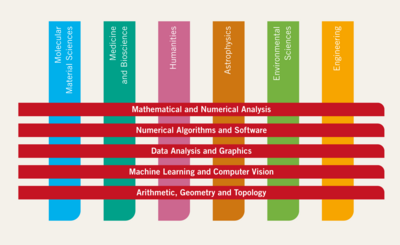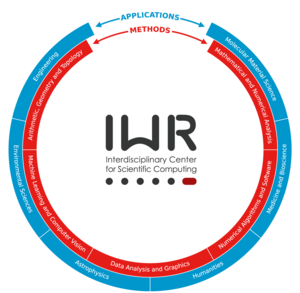Research @ IWR
The research at IWR is best characterized by its interdisciplinarity as it is conducted in a fruitful dialogue between mathematicians and computer scientists and those from various fields of computational science and experiment. Inspired by the needs and challenges of natural sciences, engineering and technology, as well as the humanities and social sciences, IWR thus strives for development of new mathematical and computer science methods for scientific computing and their implementation into efficient software for high-performance computing. These efforts of IWR push the limits of computational sciences further and hence enable new research and insights both on the method development side as well as in the scientific area of application.
IWR has built up a unique expertise in all aspects of scientific computing comprising modeling, simulation and optimization (MSO), as well as machine learning and data science (ML&DS), always with an eye on their application. Considering the present members of IWR, the following five main research fields of IWR with a focus on method development can be identified:
- Mathematical and Numerical Analysis
- Numerical Algorithms and Software
- Data Analysis and Graphics
- Machine Learning and Computer Vision
- Arithmetic, Geometry and Topology
The following six main research fields summarize the major areas of application, in which IWR members are active and in which the developed methods are utilized:
- Molecular Material Science
- Medicine and Bioscience
- Humanities
- Astrophysics
- Environmental Science
- Engineering
All major research fields are presented on the following pages in more detail. Although they are described individually, strong interactions exist between them. From the setup, it is clear that strong ties exist between the five methodological fields and the six fields of application. Very important for the development of genuinely new mathematical and computer science methods is the interaction between the methodological fields. For example, emerging new methods like of model-based and physics-inspired ML as well as data-enhanced MSO require expertise in the fields of “Mathematical and Numerical Analysis” and “Computer Vision and Machine Learning”.

